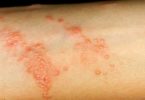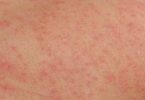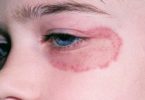What is psoriasis?
Psoriasis (say “suh-RY-uh-sus”) is a long-term (chronic) skin problem that causes skin cells to grow too quickly, resulting in thick, white, silvery, or red patches of skin. Normally, skin cells grow gradually and flake off about every 4 weeks.
New skin cells grow to replace the outer layers of the skin as they shed. But in psoriasis, new skin cells move rapidly to the surface of the skin in days rather than weeks. They build up and form thick patches called plaques (say “plax”).
Psoriasis /sɵˈraɪ.əsɨs/ is an immune-mediated disease that affects the skin. It is typically a lifelong condition.
The patches range in size from small to large. They most often appear on the knees, elbows, scalp, hands, feet, or lower back. Psoriasis is most common in adults. But children and teens can get it too.
Having psoriasis can be embarrassing, and many people, especially teens, avoid swimming and other situations where patches can show. But there are many types of treatment that can help keep psoriasis under control.








